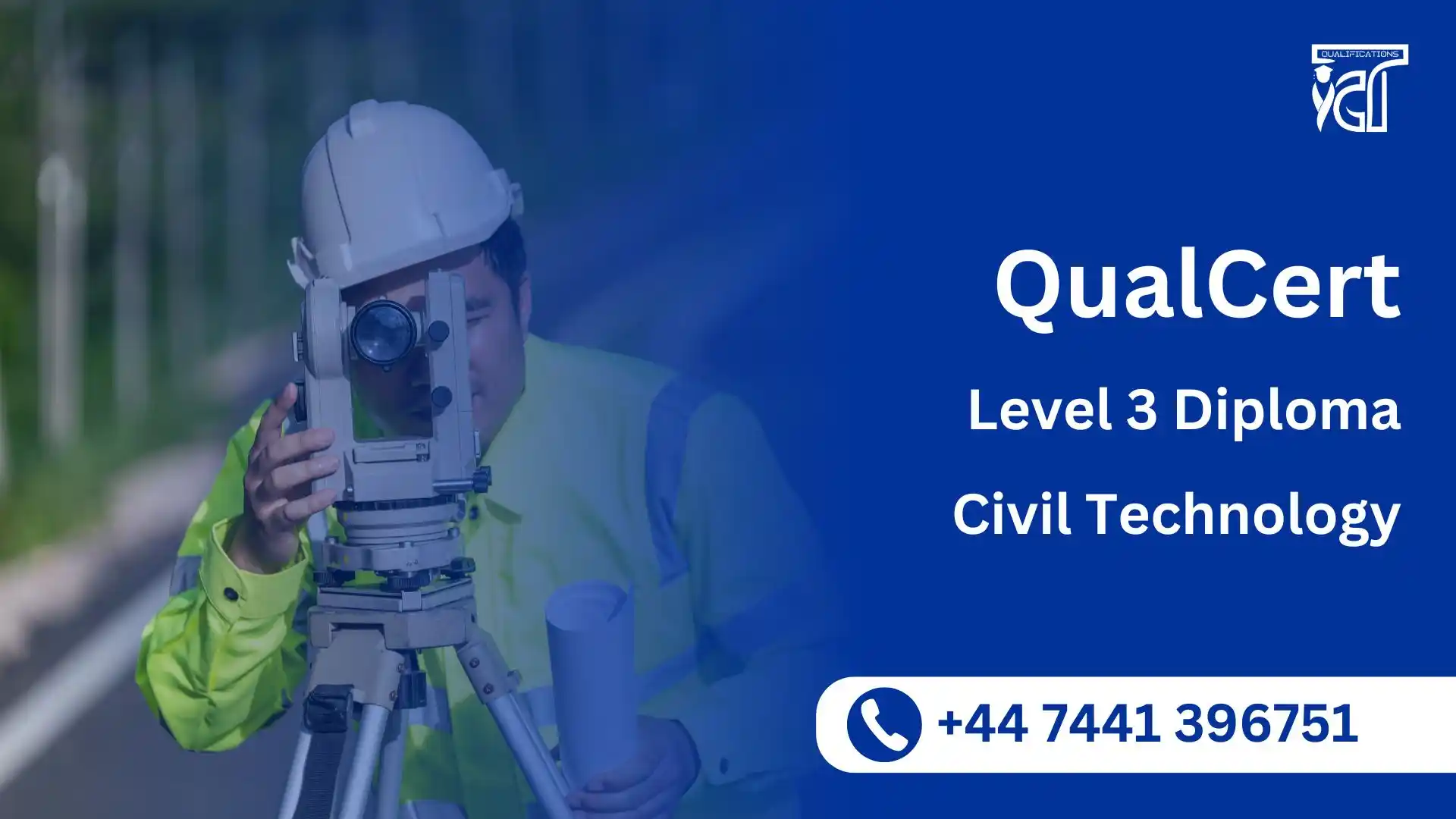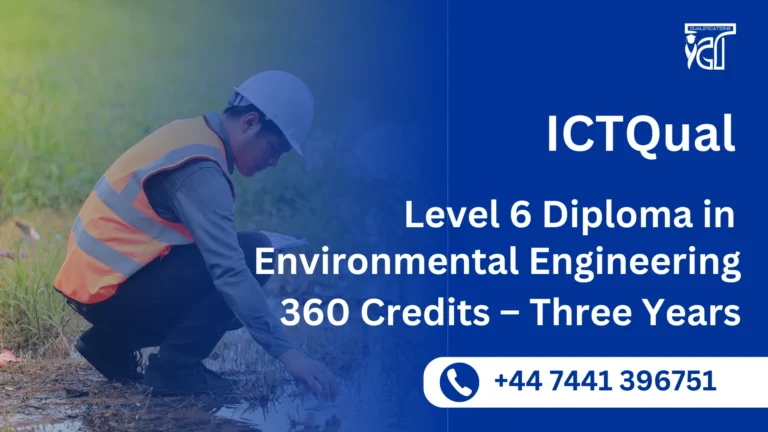The QualCert Level 3 Diploma in Civil Technology is an advanced qualification designed to equip learners with in-depth knowledge and practical skills essential for working in the field of civil engineering and construction. This course builds upon foundational concepts to cover complex aspects of structural design, construction management, material science, surveying techniques, and infrastructure development.
Through a blend of theoretical learning and hands-on training, participants will develop the competencies required to contribute effectively to the design, planning, and execution of a variety of civil engineering projects, including roads, bridges, commercial buildings, and public infrastructure.
This diploma is ideal for those seeking to progress into supervisory, technical, or engineering support roles within the construction sector, or to pursue higher education in civil engineering and related fields. The program emphasizes safety, sustainability, and modern construction technologies, preparing learners for the evolving demands of the civil construction industry.
QualCert Level 3 Diploma in Civil Technology
The QualCert Level 3 Diploma in Civil Technology is a 60-credit qualification with a Total Qualification Time (TQT) of 300 hours, including 210 Guided Learning Hours (GLH). This course is thoughtfully designed to provide targeted and efficient skill development in the field of Civil, offering learners a solid foundation to build their expertise.
| Unit Ref# | Unit Title | Credit | GLH | TQT |
| QC02003 – 1 | Advanced Structural Design | 10 | 35 | 50 |
| QC02003 – 2 | Transportation Engineering | 10 | 35 | 50 |
| QC02003 – 3 | Water Resources Engineering | 10 | 35 | 50 |
| QC02003 – 4 | Geotechnical Engineering | 10 | 35 | 50 |
| QC02003 – 5 | Construction Economics and Management | 10 | 35 | 50 |
| QC02003 – 6 | Capstone Project in Civil Technology | 10 | 35 | 50 |
GLH (Guided Learning Hours) and TQT (Total Qualification Time) are terms commonly used in vocational qualifications to help define the amount of time a learner is expected to spend on their studies.
1. GLH (Guided Learning Hours)
GLH refers to the number of hours a learner spends being directly taught, supervised, or supported during their course. This includes the time spent in activities such as:
- Classroom instruction
- Practical workshops
- One-on-one tutoring or mentoring sessions
- Online learning sessions with tutor support
In other words, GLH represents the time that learners are actively engaged with their instructors or learning activities.
2. TQT (Total Qualification Time)
TQT represents the total amount of time a learner is expected to invest in completing a qualification, including:
- GLH (Guided Learning Hours): Time spent on direct learning, as explained above.
- Self-Directed Learning: This includes time spent on independent study, research, assignment completion, preparation for exams, and any other work the learner does outside of direct teaching hours.
TQT is a broader measure that includes all the time required to achieve the qualification. It helps learners and employers understand the overall commitment required for the qualification.
Key Differences Between GLH and TQT:
- GLH focuses on direct learning with guidance or supervision.
- TQT includes GLH as well as independent study time and other learning-related activities.
Example:
If a qualification has a TQT of 600 hours and a GLH of 250 hours, it means the learner should spend 250 hours in direct learning (classroom, online, or tutor-led sessions) and 350 hours on independent study or research.
Upon successful completion of the QualCert Level 3 Diploma in Civil Technology, students will be able to:
Advanced Structural Design
- Analyze and design complex structural systems, ensuring compliance with relevant codes and standards.
- Evaluate the performance of materials under various loads and environmental conditions.
- Apply advanced techniques to optimize structural integrity and sustainability.
- Utilize modern software tools for structural analysis and design.
Transportation Engineering
- Understand the principles of transportation systems, including road, rail, and urban transit networks.
- Design efficient and sustainable transportation infrastructure.
- Evaluate traffic flow, safety, and environmental impacts of transportation projects.
- Develop solutions to transportation challenges using data-driven methodologies.
Water Resources Engineering
- Analyze water resource systems, including hydrology, hydraulics, and watershed management.
- Design water supply, drainage, and irrigation systems for urban and rural settings.
- Assess the environmental and social impacts of water resource projects.
- Utilize modern tools for water resource modeling and simulation.
Geotechnical Engineering
- Evaluate soil and rock properties for construction and engineering purposes.
- Design foundations, retaining walls, and earthworks based on geotechnical data.
- Assess slope stability and propose remedial measures for geotechnical issues.
- Integrate geotechnical principles into the planning and execution of construction projects.
Construction Economics and Management
- Analyze economic factors influencing construction projects, including cost estimation and budgeting.
- Develop project management plans covering scheduling, resource allocation, and risk management.
- Evaluate the financial feasibility of construction projects using cost-benefit analysis.
- Understand legal, ethical, and contractual aspects of construction management.
Capstone Project in Civil Technology
- Apply theoretical knowledge to a real-world civil engineering project.
- Demonstrate problem-solving, teamwork, and project management skills.
- Conduct research, analyze data, and propose innovative solutions to engineering challenges.
- Present project findings in a professional manner, using technical reports and presentations.
Course Benefits: QualCert Level 3 Diploma in Civil Technology
✅ Advanced Industry Knowledge
Gain deeper insights into civil engineering principles, structural analysis, construction materials, and project management, preparing you for mid-level and technical roles in the civil construction sector.
✅ Enhanced Practical Skills
Develop a strong skill set in surveying techniques, site supervision, blueprint reading, quality control, and safety management, making you job-ready for complex construction and infrastructure projects.
✅ Career Progression Opportunities
Increase your chances of securing roles such as site supervisor, civil engineering technician, construction manager assistant, or project coordinator, with the potential to advance into higher education or specialized training programs.
✅ Recognition in the Construction Industry
Obtain a respected and industry-recognized qualification that demonstrates your technical competence and professional credibility in civil technology.
✅ Preparation for Leadership Roles
Learn to apply problem-solving, critical thinking, and decision-making skills needed for supervisory and managerial responsibilities on construction sites.
✅ Focus on Sustainable Construction Practices
Understand the importance of environmental sustainability, resource management, and modern building technologies within civil engineering projects.
✅ Pathway to Higher Education
Serve as a stepping stone toward advanced diplomas or university degrees in civil engineering, construction management, or architecture.
Ideal Learner: Who Should Enroll?
The QualCert Level 3 Diploma in Civil Technology is designed for individuals who:
- Aspire to build a professional career in civil engineering, construction management, or infrastructure development, and want to develop advanced technical and supervisory skills.
- Have completed a Level 2 qualification in Civil Technology or a related field, and wish to expand their knowledge and responsibilities in the construction industry.
- Construction site workers, technicians, or tradespeople looking to transition into supervisory, project coordination, or technical support roles.
- Junior engineers, drafting assistants, or site supervisors seeking to formalize their skills with an industry-recognized qualification.
- Individuals interested in mastering structural design principles, material selection, surveying, and quality control for civil engineering projects.
- Professionals aiming to deepen their understanding of modern construction methods, sustainability practices, and safety regulations in the industry.
- Those planning to pursue further studies in civil engineering, architecture, construction management, or environmental engineering at higher education institutions.
Entry Requirements
Register Now
Qualification Process
Qualification Process for the QualCert Level 3 Diploma in Civil Technology
- Self-Assessment:
Begin by evaluating your eligibility to ensure you meet the qualification requirements, including work experience, knowledge, and language proficiency. - Registration:
Complete your registration by submitting the required documents, including a scanned copy of a valid ID, and paying the registration fee. - Induction:
An assessor will conduct an induction to confirm your eligibility for the course and explain the evidence requirements. If you do not meet the criteria, your registration will be canceled, and the fee will be refunded. - Assignmnets & Evidence Submission:
Provide all assignmnets and the necessary evidence based on the assessment criteria outlined in the course. If you are unsure of the required evidence, consult with the assessor for guidance on the type and nature of evidence needed. - Feedback and Revision:
The assessor will review your submitted evidence and provide feedback. Evidence that meets the criteria will be marked as “Criteria Met,” while any gaps will be identified. You will be asked to revise and resubmit if needed. - Competence Evidence:
Submit final evidence demonstrating that all learning outcomes have been met. This evidence will be marked as “Criteria Met” by the assessor once it is satisfactory. - Internal Quality Assurance (IQA):
The Internal Quality Assurance Verifier (IQA) will review your evidence to ensure consistency, quality, and compliance with standards. - External Verification:
The IQA will submit your portfolio to QualCert External Quality Assurance Verifiers (EQA) for final confirmation. The EQA may contact you directly to verify the authenticity of your evidence. - Certification:
Upon successful completion of all checks, QualCert will issue your official certificate, confirming that you have attained the QualCert Level 3 Diploma in Civil Technology.







